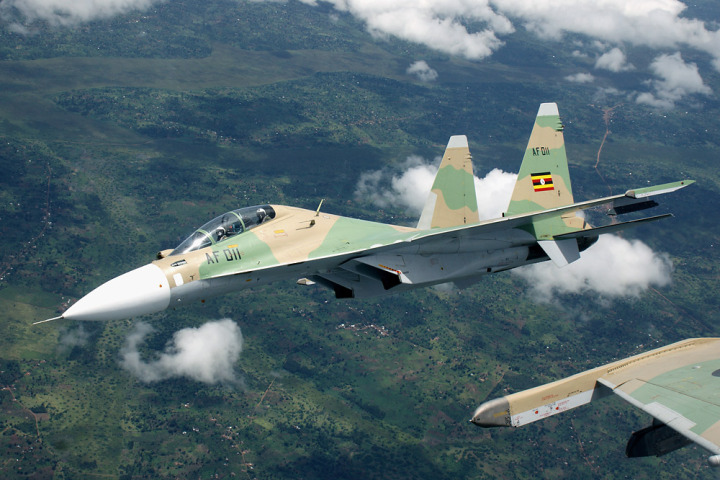Why Uganda and Angola Are Flying State of the Art Russian Su-30 Fighters
Each of the African countries has a dozen

Uganda was the first African country to buy Su-30 fighter-bombers from Russia. While this acquisition was often explained by the possible requirement to protect oil sources that might – or might not be – be found in the south of the country, the local air force made the decision to buy Su-30s, for a host of different reasons.
Most of these were related to the Ugandan involvement in the Congo Wars fought between 1996 and 2003 and, more recently, Uganda’s pursuit of the Lord’s Resistance Army. Both experiences showed that the Ugandan air force needed a long-range, multi-role fighter-bomber – simply because of the requirement to hit targets that were hopelessly outside the range of existing jets.
With Ugandan pilots already trained on such Eastern types as the MiG-21 and L-39 and the necessity of replacing a miscellany of combat types already in service, the Su-30 was actually a logical choice.
Angola followed in fashion and placed an order for Su-30s for similar reasons, including the requirement to replace old and worn-out MiG-23s and Su-22s, it own experiences in the Congo Wars and also its own wars against local insurgents. Angola also needed to outmatch Botswana’s CF-5s in the event of a border dispute.
Angola has long had one of the largest air forces in Africa, a fact which owes to the Angolan civil war from 1975-2002. During the 1970s and 1980s, enormous amounts of outside support poured into the country in an extended Cold War proxy conflict — a war which began to recede following the 1994 Lusaka Protocol.
South Africa’s intervention and its heavy use of air power — bombing bases and strafing convoys — posed as one of the MPLA’s biggest threats.
The MPLA’s extensive support and heavy combat experience also meant Angolan pilots — schooled by Romanian instructors — became some of the best on the continent.
As of 2016, the Angolan air force numbers some 83 combat-capable aircraft, including six Su-27 Flankers, 26 MiG-23 Floggers of two variants, 20 MiG-21bis Fishbeds, 13 Su-22 Fitters and one Su-24 Fencer amounting to the fighters capable of air-to-air combat. Ten Su-25 Frogfoots are Angola’s only dedicated ground-attack jets, although 42 of its fighters have dual-roles. Angola has a fleet of 44 Hind attack helicopters.
The first of the 12 Sukhoi Su-30K fighters Angola ordered in 2013 $1 billion have arrived in the country, giving a country with one of the most formidable air forces in the region some of the best military hardware Russia has to offer.
Angola enters the club of African states possessing Su-30s along with Uganda and Algeria. The planes bounced around a lot before they got there.
In 2013, Angola inked the purchase with Russia for the fighters, which served with the Indian Air Force from 1998-2005 before returning to Russia in exchange for more modern Su-30MKIs. Via Russia, the Su-30Ks headed to Belarus for refurbishment and an upgrade to their radar and navigation systems, before heading to Angola.
The Su-30K — a commercial export version of the Flanker-C, per its NATO reporting name — is a highly maneuverable aircraft that fills a similar role to the U.S. F-15E Strike Eagle, capable of both ground attack and air superiority missions. Its range amounts to more than 1,800 miles and can boost to a maximum speed of Mach 2. The warplane’s maximum payload is 18,000 pounds of bombs, rockets and missiles mounted on 12 hardpoints.
Source: War Is Boring

Russia is becoming quite the arms dealer of late.
open wide america !